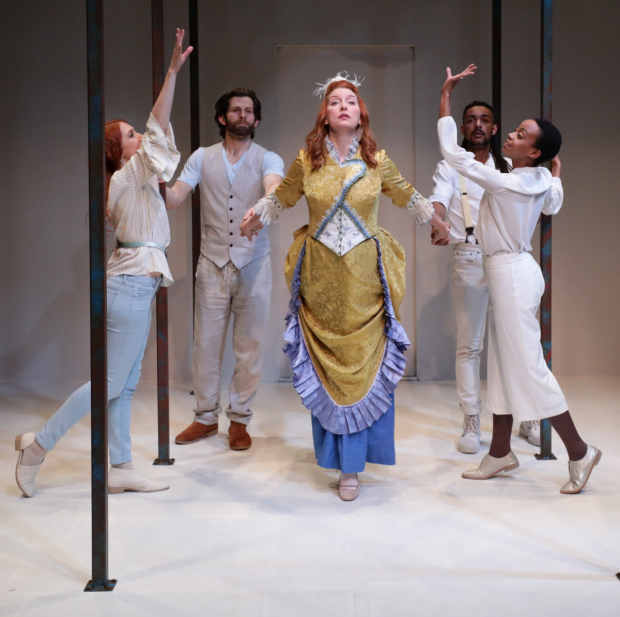Virginia Woolf’s Time-Spanning Novel Orlando Comes to the Lyric Stage

(© Mark S. Howard)
As it turns out, there are a great many reasons to be afraid of Virginia Woolf.
Her 1928 novel, Orlando: A Biography, written for and about her longtime lover and friend, Vita Sackville-West, is a genre-bending, form-pushing, era-spanning novel that remains one of Woolf’s most accessible and engrossing works.
The ever-ambitious and frequently zany Sarah Ruhl adapted Orlando for the stage 15 years ago, and the work, officially titled Virginia Woolf’s Orlando, is now playing at Boston’s Lyric Stage.
Under the tactless direction of A. Nora Long, the play bears none of the hallmarks of a professional production. Rather, Orlando unfurls with the guideless chaos of an unfettered improv exercise. The 90-minute play leaves the audience feeling as if they are on the outside of some very elaborate inside joke. The theater-esque conceit that has been built around Woolf's narrative ensures that the plot, which is already fast-paced and convoluted, is nearly impossible to follow.
The story revolves around the romantic and artistic exploits of a handsome nobleman named Orlando who, in his 30th year of life, falls asleep for a week and wakes up a woman. Orlando now makes her way as a woman from the 17th to 20th centuries encountering both the limitations of her sex, because of social and political ramifications, and the benefits of forgoing such limitations.
The questions of gender at the heart of Orlando make this an ideal story for our current moment, yet no such meditations can be gleaned from this particular production or its troublesome adaptation. Lovers of Ruhl’s previous work — including The Clean House, Eurydice, and In the Next Room, or the Vibrator Play — that mined similar sociopolitical depths will be sorely disappointed.
The cast, too, cannot prevail over the litany of problems that plague both Ruhl’s adaptation and Long’s production. As Orlando, Caroline Lawton is only sporadically charming. In the play’s first half, when she is a man, Lawton is missing any sense of natural androgyny, and as a result, the performance feels too deliberate. Lawton fares better once Orlando wakes up as a woman, but even then she is no match for the production that swirls incessantly around her. The small chorus, playing a wide variety of roles throughout, falls entirely into caricatures that appear devoid of any true character development.
Richard Wadsworth Chambers’s handsome, pristine white set is the blank canvas that this rollicking adaptation of Orlando requires in order to fulfill all the variable needs of time periods, place, and character. Yet Jessica Pribble's costumes and Steven McIntosh's lighting bring almost no color into this world, save for the pops of red, pink, yellow, and blue that appear mostly as part of Orlando's costumes. As a result, the production ends up looking as bland as it feels.
One would think that the gender-centric themes at the heart of Orlando would make it an ideal choice for this exact sociopolitical moment. And indeed, it probably is. But in this production — the adaptation’s flaws aside — the story’s truth and intent are buried completely by all the noise.











